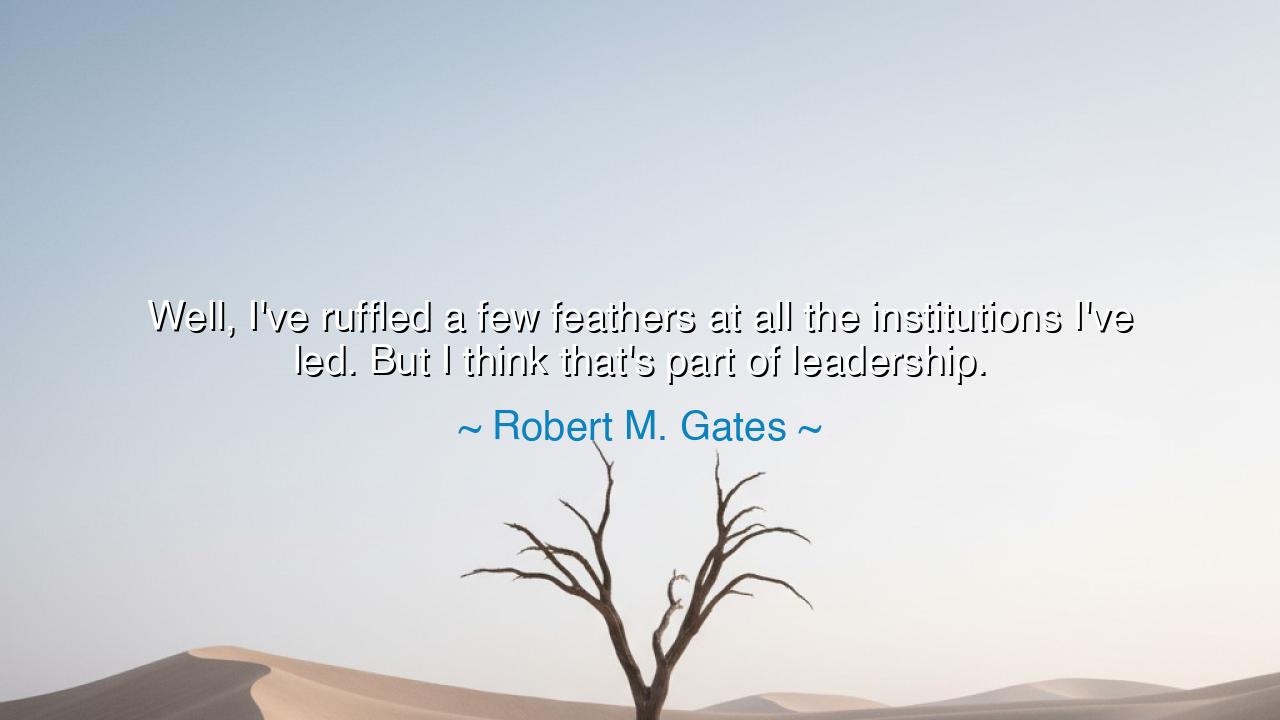
Well, I've ruffled a few feathers at all the institutions I've
Well, I've ruffled a few feathers at all the institutions I've led. But I think that's part of leadership.






Hear the words of Robert M. Gates, a man who bore the weight of leading great institutions, who said with calm strength: “Well, I’ve ruffled a few feathers at all the institutions I’ve led. But I think that’s part of leadership.” In this simple declaration lies a truth that is as sharp as the sword and as enduring as the mountain: that to lead is not to please, but to disturb; not to flatter, but to awaken; not to glide with the current, but to stir the waters until the hidden depths are revealed.
For what is leadership, if not the courage to speak what others fear to say, to act when others would rest, and to challenge where others would submit? The ancient philosophers taught that harmony without justice is but a lie, and peace without truth is but a mask for decay. Thus, the leader who dares to confront complacency will always ruffle feathers, for comfort is the enemy of growth, and those who cling to comfort will resist change.
Consider the story of Winston Churchill, who in the years before the Second World War cried out against the rising threat of tyranny. Many mocked him, many scorned his warnings, and his words unsettled the halls of Parliament. Yet when the storm broke upon Europe, his voice became the shield of a nation. He had ruffled feathers, but in doing so he preserved freedom. History shows us that the leader who never offends is rarely the leader who saves.
So too can we look to the life of Moses, who led a people out of slavery. His every step roused opposition—both from Pharaoh’s court and from the very people he sought to liberate. Yet he pressed on, for he knew that the path to the Promised Land required disruption of the old order. Leadership, as Gates reminds us, is not about keeping everyone content, but about guiding them toward higher ground, even if the journey stings the heart and bruises the ego.
The meaning of Gates’s words is therefore twofold: first, that true leadership is measured not by popularity, but by progress; and second, that resistance is not a sign of failure, but often a mark of fidelity to the mission. A leader who never disturbs the nest may keep peace, but the chicks will never learn to fly. Ruffling feathers is the labor of awakening, shaking men and women from slumber so that they might rise to their potential.
The lesson to take into our own lives is clear: do not fear the disapproval of others when you are guided by principle. Whether you lead a family, a community, or your own conscience, know that growth comes with friction, and truth often comes clothed in discomfort. Seek not to wound for pride’s sake, but to stir for the sake of righteousness. Let your actions be rooted in justice, and let your courage be greater than your desire to be liked.
Practical wisdom follows: speak truth even when silence would bring applause; act with integrity even when compromise would bring ease; lead with vision even when those around you cry for comfort. For in the end, it is better to be remembered as one who ruffled feathers in pursuit of what is right, than as one who left the world undisturbed, unchanged, and unawakened.
So, my child, carry this teaching in your heart: leadership is not the path of applause, but of burden. It is not the art of pleasing, but of guiding. To ruffle feathers is not a fault, but a sign that you have moved the flock, and perhaps even lifted it toward flight. And in this, you walk the road of the true leader—the one who disturbs the present so that the future may be born.






AAdministratorAdministrator
Welcome, honored guests. Please leave a comment, we will respond soon